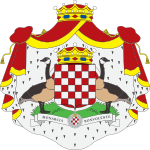Sancratosian nationality law
| Sancratosian Nationality Act | |
|---|---|
 | |
| National Council of Sancratosia | |
| Law no 3 of 5 January 2022 on the nationality | |
| Territorial extent | Sancratosia |
| Enacted by | Government Council of Sancratosia |
| Date passed | 4 January 2022 |
| Date signed | 5 January 2022 |
| Signed by | Princess Cloe |
| Administered by | Ministry of State |
| Status: Current legislation | |
Sancratosian nationality law outlines the criteria under which individuals can obtain citizenship in the Principality of Sancratosia. Similar to many micronations, citizenship is primarily acquired through a process of naturalization. Provisions within the Civil Code also allow for citizenship to be acquired by descent or through marriage.[1]
Applicants for citizenship must be aged 13 years or older to be eligible.
Dual system of citizenship
Sancratosians by status
In the Principality of Sancratosia, individuals are classified as nationals or residents, each category entitling them to specific rights and privileges.
Nationality
Sancratosian nationals enjoy full political rights, including the ability to obtain passports, identity cards, and access certain governmental programs. They are automatically granted residency upon application for nationality.
Acquiring nationality is not automatic; applicants must undergo a validation process overseen by the Ministry of State. A mandatory citizenship test evaluates candidates on their knowledge of Sancratosia, adherence to its values and principles, and reasons for seeking nationality.
Nationality can be forfeited by acquiring citizenship from another nation.[a] Exceptions exist for individuals who cannot renounce their original nationality or who accept public positions conferred by a foreign government, as stipulated by law.
The acquisition and reacquisition of nationality is the prerogative of the Sovereign Princess.
Residency
Residency grants individuals civil rights but not political rights within Sancratosia. It is automatically granted to individuals applying for Sancratosian nationality who do not meet all requirements.
Residency[b] is generally granted automatically upon request and is lost only if the individual establishes permanent residence in a foreign country with no intent to return.
Honorary citizenship
In the Principality of Sancratosia, honorary citizenship may be conferred by the Sovereign Princess upon individuals who have not formally applied for regular citizenship. This honorific status is separate from the official count of citizenship statistics. Honorary citizens typically enjoy similar rights and privileges as Sancratosian nationals.
List of honorary citizens

The first honorary citizenships were offered to select individuals participating in MicroCon 2022.[2] Honorary citizenships have been granted to notable individuals, including:
| Date | Name | Micronation |
|---|---|---|
| 6 August 2022 | President Kevin Baugh | |
| 6 August 2022 | First Lady Adrianne Baugh | |
| 6 August 2022 | Prince Jean-Pierre IV | |
| 6 August 2022 | Grand Duke Travis | |
| 6 August 2022 | Prime Minister Jordan Farmer | |
| 6 August 2022 | King George II of Slabovia | |
| 6 August 2022 | Grand Marshal Yagjian | |
| 6 August 2022 | First Lady Noelle | |
| 6 August 2022 | Minister-President Dominic Desaintes | |
| 1 July 2023 | Queen Carolyn I | |
| 1 July 2023 | Summi Imperatoria Christina I & II | |
| 1 July 2023 | Olivier de Constance | |
| 1 July 2023 | Emperor Eric |
See also
Notes and References
Notes
References
- ↑ Principality of Sancratosia, "Civil Code of Sancratosia", sancratosia.org
- ↑ Principality of Sancratosia (6 August 2022), "Sovereign Ordinance no 80 of 6 August 2022 on the granting of Sancratosian honorary citizenship", sancratosia.org
